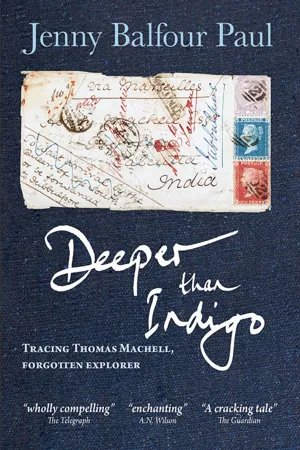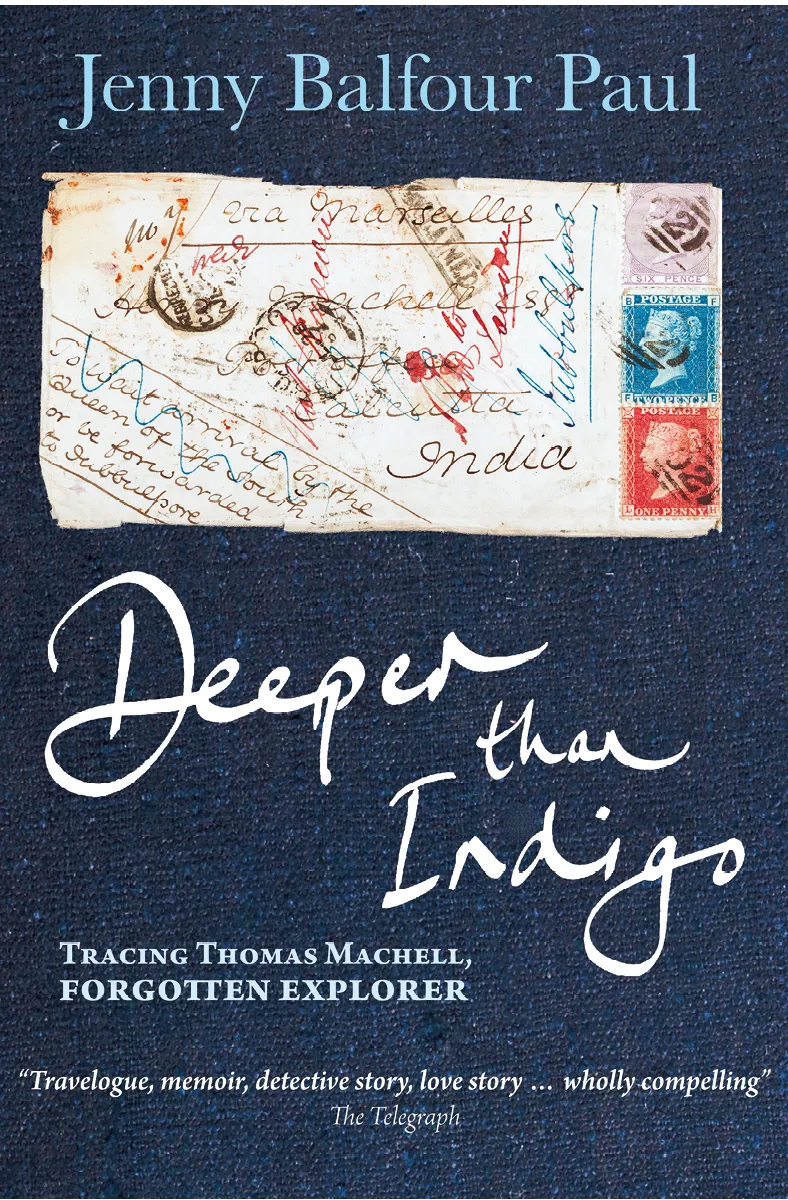To the late Thomas Machell of Crackenthorpe
and his wider family
and to my own immediate family,
my late husband Glencairn, children Finella and Hamish
and grandchild Felix Glencairn
Contents
1. Meeting Thomas
2. Running Away from Home
3. Passages to India
4. Exotic Landfalls
5. Opium Wars
6. Going Home
7. Rendezvous at the Rectory
8. Coals to Nuku Hiva
9. Marquesan Magic
10. Guano and Missions to Patagonia
11. The Ghosts of Crackenthorpe
12. Into the Eye of the Wind
13. Singing the Blues
14. Kissing the Crescent and the Cross
15. Limbo
16. Memories of Indigo
17. Suspended between Two Magnets
18. ‘Further Travels and Adventures
of a Vagrant Son’ – up the Indus
19. Coffee Time
20. Closing the Gap
21. Between the Known and the Unknown
22. Beginning of the End
23. Rowing into Eternity
24. Into the New World
25. Back to the Beginning
26. Moments of Epiphany
27. Eureka!
28. Machells Reunited
29. Pirates of the Arabian Seas
30. Come Back Yesterday
31. Twist in the Tale
Acknowledgements
Chronology
Reviews
1. Meeting Thomas
Let your life lightly dance on the edges of Time
like dew on the tip of a leaf.
(from The Gardener, Rabindranath Tagore)
I first met Thomas at the very end of the 20th century. The attraction was instant and when I parted from him in London I felt physically sick.
Back home in the West Country I immersed myself in preparations for the last Christmas of the century. I made mince pies, wrapped presents, and dangled over the fireplace my great-great-grandmother’s quaint Victorian fairies, almost succeeding in putting Thomas out of my mind. Almost, but not quite; every so often I caught myself thinking about him. The pungent spices of mulled wine transported me back not only to the East Indies but also to the lingering flavours of our meeting. I recalled his hints of exotic travels in far-off lands, and his longing for someone to heed his words before the century was over. I had no need of a new man in my life, but I sensed such yearning beneath his spirited tone and adventurous tales that it seemed heartless to turn my back on him without giving him a second chance.
Thomas was 129 years old the day I was born, and 175 when we met. But he will remain forever younger than me, since he died at 38, whereas I am still going strong. The fact that he is dead is no bar to his speaking to me, or to anyone else for that matter. He made sure of this during his lifetime by treating his personal Journals as his ‘Talking Papers’. And talk they certainly do – in five volumes totalling almost 3,000 pages, sprinkled with whimsical watercolours.
These extraordinary Journals came my way by serendipity. An acquaintance from Devon, a librarian, while attending a meeting at the British Library in the spring of 1999, had happened to notice a manuscript volume in a showcase. It was open at a page with an amusing watercolour entitled ‘Indigo planters after tiffin’. He had glanced at the label. It described the volume as written by a Victorian, Thomas Machell, ‘midshipman in the merchant navy and indigo planter’. The word ‘indigo’ sparked the librarian because he had previously supplied me with books for my indigo studies.
So indigo was the bait that lured me to Thomas, though he waited long enough to reel me in. I had been hooked by indigo one summer’s day when, in the granite courtyard of an old Devon farmhouse, I fed a white cloth deep into an indigo dye-vat, pulled it out minutes later and watched its colour transform in the air from yellow through turquoise to midnight blue. I resolved there and then to discover more about this magical and most universal dyestuff, unaware that the hook was in for life and that I would pursue indigo all over the world until Thomas caught me and took over. Then I had to pursue him all over the world.
I cradle Thomas’s life in my hands as I carry his Journals from the Issue desk and place them on a large library table. For some reason I’m drawn to Volume Two. I ease the bound book from its case, feeling its density in my palms before opening it at random. As I start to decipher the slanting script with its wayward punctuation my breath changes rhythm. The modern readers around me fade away and I join Thomas on his lonely veranda in the Bengali jungle on a night of steamy heat in the 1850s. Peering over his shoulder, I watch his hand move to and fro as he dips his quill into the inkpot to transfer his thoughts onto the paper. He is smoking his meerschaum, which keeps a halo of insects at bay. Their incessant buzzing joins the sounds of the quill’s scratch and the harsh sawing of crickets. Thomas pauses and stares unseeing into the invisible, suffocating vegetation. He is brooding on his life and, out of the thousands of passages I might have read first, I have chanced across him just when he is musing on the unexpected way that indigo is shaping his life.
I lay aside this volume and try another (Four). The very next passage I read, again chosen at random, also hits home. It is dated the first day of April 1851 and Thomas has illuminated the letter ‘A’ and added a quotation from Byron:
’Tis strange, the shortest letter that man uses
Instead of speech, may form a lasting link
Of ages; to what straits old Time reduces
Frail man, when paper – even a rag like this –
Survives himself, his tomb and all that’s his.
Just so. Thomas continues: ‘Yes I think it very probable that like my more learned namesake Thomas Machell of Carlisle I shall leave behind me some seven volumes of manuscript papers… and mayhap the words carelessly written at Rooderpore factory will be lighted upon in some musty library in the 20th century and quoted by some descendant who has heard that such volumes exist somewhere.’
That passage, like the indigo one, seems to target me. After all, I did indeed hear that such volumes existed in a library, as Thomas anticipated – and though the new British Library isn’t ‘musty’, the old one where they first landed certainly was. I am fulfilling Thomas’s forecast of their being ‘lighted upon’ in the 20th century but have cut things pretty fine by finding them just weeks before the century ends. I can also see that in the future I might find occasion to quote them, though I am not a ‘descendant’ as far as I know. It is odd to be holding five volumes rather than Thomas’s predicted seven, though he voiced his forecast in Volume Four when very much alive, so how could he possibly have known that he would leave behind even five volumes, let alone seven? Strange. There is just time to look for clues at the end of the last volume before the library shuts.
This one transports me to the Malabar hills of southern India, where I also join my former self, since I stayed there in 1970. Both Jennys, past and present, savour the sweet coffee blossom with Thomas, but are thankful to be spared the rats that plagued him: ‘16th July 1856. The house is overrun with rats made traps for the unwary and squashed three.’ Together we experience the relentless monsoon weather. ‘The wind howls and whistles through the chinks and crannies of the old Bungalow, then suddenly it dies away and the heavy pattering of rain is heard faster and faster through the long hours of the dreary night.’ Two months later dense clouds still envelop both jungle and Thomas himself as he pens his final entry: ‘I have no longer the buoyant spirits and unbroken health of younger days… at thirty-two I feel older than many I have seen with ten more years on their shoulders.’ He adds enigmatically: ‘Who shall mark the line between perseverance and rebellion, who shall tell where the resignation of a Christian or the fatalism of an Oriental begins or ends.’ Who indeed? I turn the page to find his very last sentence: ‘I grope in darkness Light of the World. Grant to me that I may receive my sight.’
The lively young man of the earlier volumes now sounds utterly depressed. I assume he was on the point of death when he wrote those words in his rat-filled Bungalow.
The library is closing. The Journals are recalled to the Issue desk and I am recalled to the present, feeling disturbed and queasy.
At the time I was preparing to deliver the first lecture of the new millennium at London’s Royal Geographical Society, its subject being ‘Travels in Pursuit of Indigo’. I couldn’t resist replacing two images of mine that I had previously selected with two watercolours from the Journals, thus giving Thomas his very first public airing in that Society’s historic lecture hall, where such famous explorers as Shackleton have lectured. How proud and amazed Thomas would have been to see projected on a huge screen that comical sketch ‘Indigo planters after tiffin’. The other projection was his hand-drawn 1846 map of ‘part of Bengal showing stations or towns, and indigo and sugar factories’. His old map seemed just the thing in such a setting. I pointed to indigo estates and towns that were just hours apart by horseback in Thomas’s day but now lay several days from each other, modern transport notwithstanding, due to the frontier that had divided Bengal between India and Bangladesh since 1971.
Having assumed that Thomas died suddenly aged 32 after writing the entry in southern India that concludes Volume Five, I contacted the organisations in London dedicated to recording British deaths and burials in India to establish when and where he had been buried. Their investigations showed no Thomas Machell to have died in India, though burials of other Machells were on their lists. This was surprising. It made me wonder whether a sickly Thomas had struggled on board ship intent on returning home to convalesce (as he tells us he has done before) but had died en route and been buried in some alien port, or perhaps at sea, echoing a scenario he had himself foreshadowed:
2nd December 1850. Let us take a look at the living freight of this ‘Budgerow’ boat coming down from the Upper Provinces. On a low couch surrounded by a few dark faced servants an emaciated European is lying, gasping painfully for air whilst one of his attendants waves the hand punkah over his fevered head, see he sleeps and sleeping dreams of home. Disturb him not poor fellow, he is going home on sick certificate, sleeping he dreams he is there, hears the chime of the village bells, and sees again the loved faces, from whom he has long been absent, but let him sleep on; for sleeping he dreams of that home which he is destined never to reach, for he will be shipped on board to die ere he reach the Line and add to the many thousands who lie under those dark...

